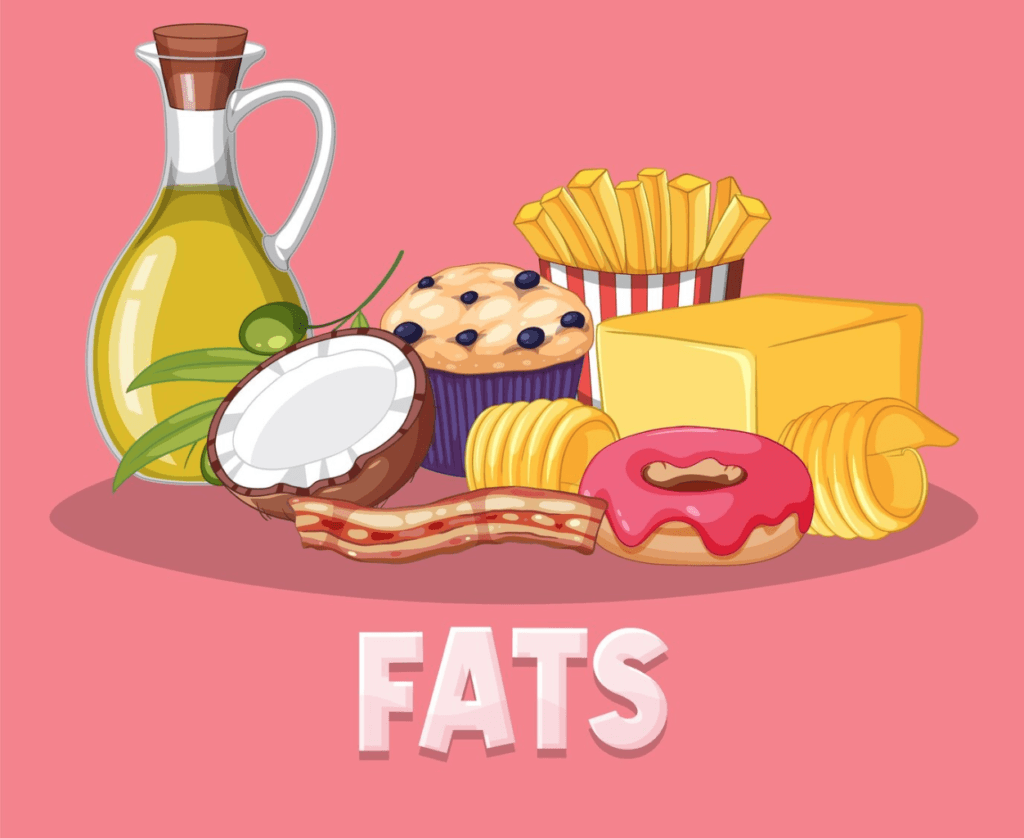What Fats Are Good for You? A Guide to Healthy Fats
Table of Contents
Introduction

Fats are a crucial part of a balanced diet, providing energy and supporting many vital functions in the body. However, not all fats hurt health. Some can improve well-being, while others can contribute to health issues. Knowing which fats to prioritize can help you make better choices for your overall health. In this guide, we’ll explore the different types of fats, identify the ones that benefit your body, and offer tips on how to include them in your daily meals.
Types of Fats: Which Ones Are Good?

Saturated vs. Unsaturated Fats
Fats can be categorized into two major types: saturated fats and unsaturated fats. Saturated fats, commonly found in foods like butter, red meat, and cheese, can contribute to high cholesterol levels when eaten in excess, increasing the risk of heart disease.
In contrast, unsaturated fats, found in plant-based oils, nuts, seeds, and fish, are known to have heart-protective effects. These fats help lower bad cholesterol (LDL) and maintain healthy cholesterol levels. Monounsaturated and polyunsaturated fats are two subtypes of unsaturated fats that are particularly beneficial.
Trans Fats: The Worst Kind of Fats
Trans fats are artificially created fats found in processed and fried foods, like pastries, margarine, and fast food. These fats not only raise bad cholesterol levels but also lower good cholesterol, making them harmful to heart health. It’s best to avoid foods containing trans fats whenever possible.
Why Your Body Needs Healthy Fats
Healthy fats play a significant role in many body functions. They store energy, support hormone balance, and help absorb fat-soluble vitamins like A, D, E, and K. In addition, they provide protective benefits for the heart and brain.
The Health Benefits of Good Fats

Heart Health
Eating monounsaturated and polyunsaturated fats can improve heart health by reducing bad cholesterol and lowering the risk of heart disease. Omega-3 fatty acids, found in fatty fish like salmon, also help reduce inflammation and support healthy blood vessels.
Brain Function
Healthy fats, particularly omega-3s, are essential for brain health. They are linked to better memory, cognitive function, and mood regulation. Research suggests that a diet rich in omega-3s may lower the risk of depression and cognitive decline.
Weight Management
Incorporating healthy fats into your diet can help with weight control. These fats promote a feeling of fullness, reducing the tendency to overeat. Additionally, they provide a steady source of energy, helping you stay active and alert throughout the day.
Best Sources of Healthy Fats

Monounsaturated Fats
Monounsaturated fats are great for heart health and can be found in:
- Olive oil
- Avocados
- Nuts such as almonds, cashews, and pecans
- Seeds like pumpkin and sunflower seeds
Polyunsaturated Fats (Including Omega-3 and Omega-6)
These fats support heart and brain health. Key sources include:
- Fatty fish (salmon, sardines, mackerel)
- Walnuts
- Flaxseeds and chia seeds
- Sunflower and soybean oils
Healthy Saturated Fats
While saturated fats should be consumed in moderation, some can be part of a healthy diet, such as:
- Coconut oil
- Butter from grass-fed cows
- Full-fat dairy products, in limited quantities
How to Add Healthy Fats to Your Diet
Cook with the Right Oils
Choose oils rich in healthy fats for cooking. Olive oil and avocado oil are excellent choices for medium-heat cooking, as they are high in monounsaturated fats. For high-heat cooking, use coconut oil in moderation due to its saturated fat content.
Include Healthy Fats in Daily Meals
Here are some practical tips for adding healthy fats to your meals:
- Add avocados to salads, sandwiches, or smoothies.
- Sprinkle nuts and seeds on top of oatmeal or yogurt.
- Eat fatty fish like salmon or mackerel once or twice a week to boost your intake of omega-3s.
Avoid Unhealthy Fats
Limit your consumption of unhealthy fats, especially trans fats, found in many processed and fried foods. Opt for whole, minimally processed foods that are naturally high in healthy fats.
Conclusion
Choose the Right Fats for Better Health
Incorporating healthy fats into your diet is a simple and effective way to support your heart, brain, and overall health. Focus on consuming unsaturated fats from sources like olive oil, nuts, seeds, and fatty fish, while minimizing your intake of trans fats and saturated fats.
Remember, balance is key. By choosing the right types of fats and consuming them in moderation, you can improve your health and feel your best every day.






